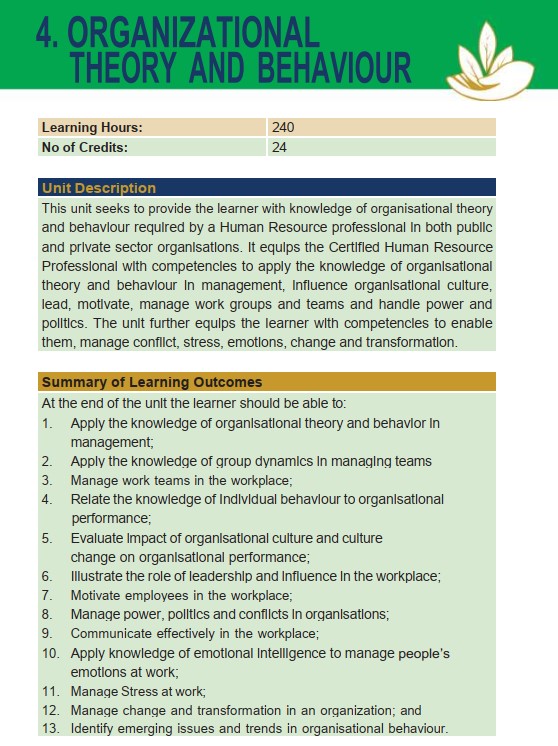
Topic
1. Introduction to Organisational Theory and Behavior
1.1 Introduction to organisation behaviour
1.2 Foundations and development of organisational behaviour
1.3 Nature of organisational behaviour
1.4 Theories of organisational behaviour
1.5 Models of organisational behaviour
1.6 Objectives of organisational behaviour
1.7 Application of organisational behaviour to hr practice
1.8 Organisation behaviour challenges and opportunities
2. Group Dynamics
2.1 Formation of a group
2.2 Theories of group formation
2.3 Types and characteristics of groups
2.4 Reasons for group formation
2.5 Group formation stages
2.6 Roles in groups
2.7 Group decision-making
2.8 Intergroup relations
2.9 Group cohesiveness
2.10 Advantages and disadvantages of a group
2.11 Group challenges
3. Work Teams
3.1 Introduction to teams
3.2 Reasons for team formation
3.3 Types of teams
3.4 Team leadership
3.5 Team effectiveness
3.6 Team value proposition
3.7 Comparative analysis of teams and groups
3.8 Managing teams for high performance
3.9 Multi agency approach of work teams
3.10 Challenges in teams
4. Individual Behaviour and Organisational Performance
4.1 Introduction to individual behaviour
4.2 Theories of individual behaviour
4.3 Attitude
4.4 Influence of attitude to work performance
4.5 Components of attitude
4.6 Attitude formation
4.7 Work attitudes
4.8 Job satisfaction
4.9 Personality
4.10 Components of personality
4.11 Personality theories
4.12 Personality assessment
4.13 Perception
4.14 Factors influencing perception
4.15 Managing cross-cultural differences
5. Organisational Culture and Culture Change
5.1 Introduction to organisational culture
5.2 Principles of organisation culture
5.3 Characteristics of organisational culture
5.4 Factors that influence organisation culture
5.5 Components of organisational culture
5.6 Functions of organisational culture
5.7 Impact of organization culture to business results
5.8 Family business and organisational culture
5.9 Principles of culture change
5.10 Models of culture change
5.11 Causes of culture change
5.12 Process of culture change
5.13 Factors of culture change
5.14 Impact of culture change
5.15 Managing culture in mergers and acquisitions
6. Leadership and Influence
6.1 Introduction to leadership and influence
6.2 Theories of leadership
6.3 Leadership styles
6.4 Impact of leadership to organization performance
6.5 Principles of influence
6.6 Uses and misuse of influence
6.7 Techniques of persuasion
7. Motivation
7.1 Introduction to motivation
7.2 Theories of motivation
7.3 Motivation models
7.4 Importance of motivation
7.5 Motivation continuum
7.6 Motivational dynamics
7.7 Challenges in motivation
8. Power, Politics and Conflicts in Organisations
8.1 Introduction to power, politics and conflicts in organisations
8.2 Sources of power
8.3 Types of power
8.4 Uses and effects of power
8.5 Organisational politics
8.6 Effects of politics on organisational performance
8.7 Strategies for managing organisational politics
8.8 Benefits and challenges of organisational politics
8.9 Types, causes and levels of organisational conflict
8.10 Effects of conflict to organisational performance
8.11 Conflict management strategies
9. Communication in Organisations
9.1 Introduction to communication
9.2 Importance of effective communication in organisations
9.3 Principles of communication
9.4 Factors of effective communication
9.5 Models of effective communication
9.6 Communication strategies
9.7 Communication channels
9.8 Barriers to effective communication
9.9 Development of effective communications skills
9.10 Impact of communication on work performance
9.11 Communication in crisis management
10. Emotional intelligence
10.1 Introduction to emotional intelligence
10.2 Emotional intelligence theories
10.3 Emotional intelligence skills
10.4 Emotional intelligence assessment
10.5 Application of emotional intelligence for value creation
11. Stress Management
11.1 Introduction to stress management
11.2 Types of stress
11.3 Causes of stress
11.4 Stages of stress
11.5 Effects of stress
11.6 Signs of stress
11.7 Stress management techniques
11.8 Benefits and challenges of stress management
12. Managing Change and Transformation
12.1 Introduction to organisational change and transformation
12.2 Importance of change
12.3 Models of organisational change
12.4 Principles of change management
12.5 Change process
12.6 Enablers of change
12.7 Resistance to change
12.8 Managing resistance to change
12.9 Organisation transformation
13. Emerging Issues and Trends in Organisational Behaviour and their ICT Applications
13.1 Improving peoples’ skills
13.2 Improving quality and productivity
13.3 Total Quality Management (TQM)
13.4 Managing workforce diversity
13.5 Responding to globalisation
13.6 Empowering people
13.7 Coping with temporariness
13.8 Stimulating innovation and change
13.9 Emergence of e-organisation & e-commerce
13.10 Improving ethical behavior
13.11 Improving customer service
13.12 Helping employees balance work-life conflicts
13.13 Flattening world
